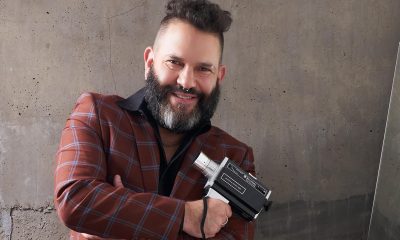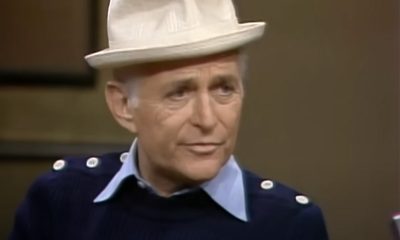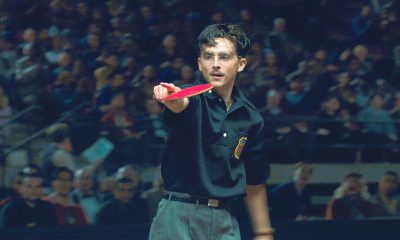Movies
After months of hype, ‘Bros,’ ‘My Policeman’ ready to debut
Fall film season offers big-budget rom-com, a trans Pinhead, and more
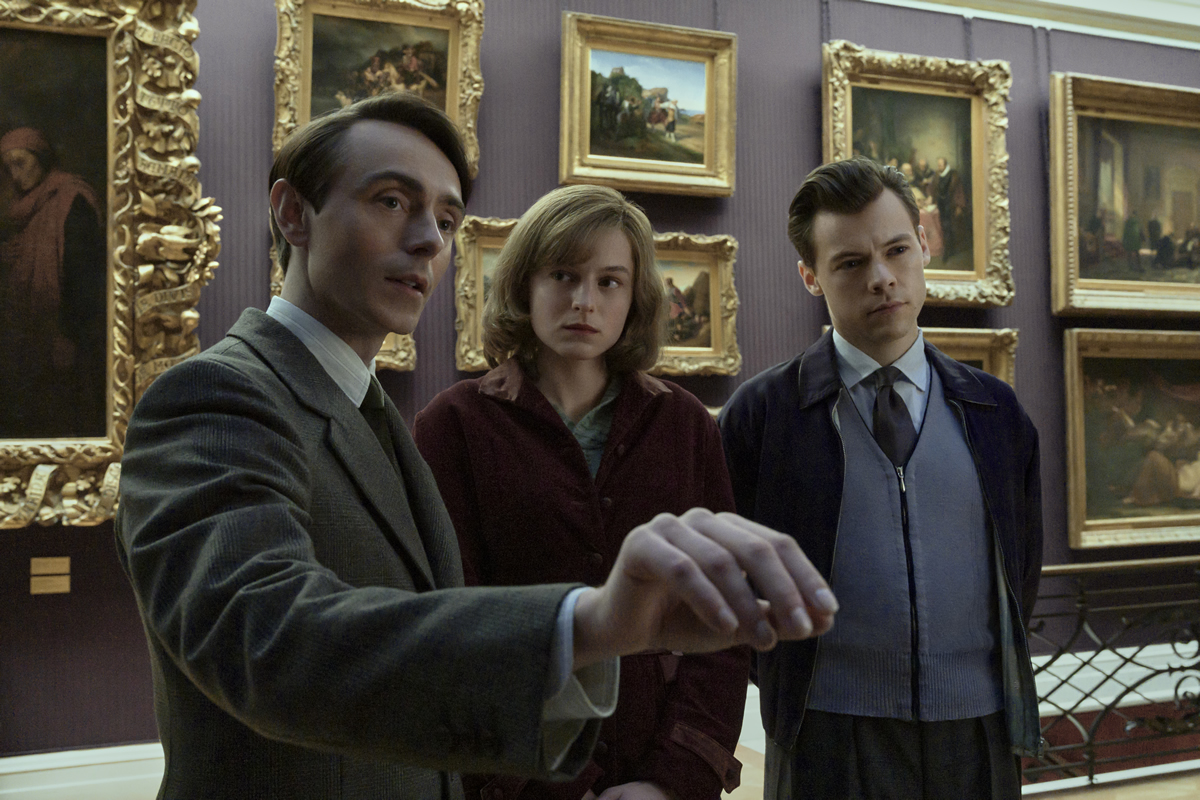
This has been a year with an unprecedented number of big titles featuring LGBTQ characters and stories, and given the amount of regressive backlash our community continues to receive from the socially conservative (i.e. bigoted homophobic) crowd, that’s a comforting thing. As we push closer to the year’s close, there are admittedly fewer stand-out offerings on deck for queer viewers – but the ones that are on their way give us plenty to look forward to, anyway. Our list of titles to look for is below:
BLONDE (Sept. 16)
Marilyn Monroe is a Hollywood icon who always held a special place in the hearts of the LGBTQ community; maybe it has something to do with being exploited for her talent and beauty while still being marginalized in a hetero-masculine world. Whatever the reason, queer film buffs should be keen to see this screen adaptation of Joyce Carol Oates’ classic bestselling novel, which boldly fictionalizes Monroe’s life and re-imagines it as a parable about the fate of women in a culture that treats their bodies as a commodity. Following Monroe from her volatile childhood, it blurs fact and fiction as it charts her rise to stardom, emphasizing the ever-widening split between her public and private personas that led to her tragic end. Written and directed by Andrew Dominik, the film stars Cuban actress Ana de Armas as Marilyn, with Bobby Cannavale, Adrien Brody, Julianne Nicholson, Xavier Samuel, and Evan Williams; it premieres in theaters on the 16th, followed by a debut on Netflix – which produced it – on Sept. 28.
PETER VON KANT (Sept. 21)
Already given a limited theatrical release on Sept. 2, this French romantic drama from writer/director François Ozon was the opening film at February’s Berlin Film Festival and has been eagerly awaited by hardcore film geeks ever since. The reason? It’s a reinterpretation of the play by Rainier Werner Fassbinder, “The Bitter Tears of Petra von Kant,” which the legendary queer filmmaker himself originally adapted for the screen in 1972 to create a revered classic of European cinema that broke ground for its depiction of same-sex relationships. Now, Ozon has re-imagined the story by swapping the gender of its protagonist – which changes everything yet nothing in this S&M-tinged tale of narcissistic hedonism and obsessive desire. It stars Denis Ménochet in the title role, with an ensemble of players that features Isabelle Adjani, Khalil Gharbia, Stéfan Crépon, and Aminthe Audiard – as well as Hanna Schygulla, the German film legend who also appeared in Fassbinder’s original movie. You might still be able to find a big screen showing somewhere near you, if you’re lucky. Otherwise, don’t worry; you’ll be able to find it streaming VOD from starting on Sept. 22.
THE DREAMLIFE OF GEORGIE STONE (Sept. 22)
We don’t often include short films in our preview lists – an oversight we frequently find ourselves regretting – but this one deserves your attention. Spanning 19 years, it tells the story of Georgie, an Australian transgender teen, and follows her on her journey to adulthood as she helps to change laws, affirms her gender, and finds her voice along the way. Directed by Maya Donna Newell (“Gayby Baby”) as an effort to push back against Australian conservative voices who pointed at children like herself, who grew up with queer and trans parents, as an argument against the country’s movement for marriage equality, it’s the result of a six-year collaborative process (with Georgie and her mom, Rebekah Robertson) that only lasts for 29 minutes – but it’s 29 minutes of inspirational, queer-affirming content you’ll want to experience.
BROS (Sept. 30)
Certainly the buzziest LGBTQ title of the year, the ferociously funny Billy Eichner’s rom-com about two commitment-challenged men and their attempt to have a relationship has already gotten us excited for its debut by way of a teaser trailer full of laugh-out-loud moments. Written by Eichner, who also stars (opposite rom-com veteran Luke Macfarlane), it’s the first time an openly gay man has been able to co-write and star in his own major studio film; not one to be content with that milestone, he went a step further by casting every principal role – even the heterosexual ones – with queer actors. Apart from these notable points, it will be interesting to see how a queer-themed romance will succeed with mainstream audiences; but there are many purely entertaining reasons to look forward to this Nicholas Stoller-directed romp, which also features TS Madison, Monica Raymund, Guillermo Diaz, Guy Branum, Amanda Bearse, Bowen Yang, Benito Skinner, Matthew Wilkas, Jai Rodriguez, Dot-Marie Jones, and a host of other familiar queer faces. It’s worth mentioning that veteran comedy filmmaker Judd Apatow was co-executive producer (alongside Stoller and Eichner), but though his pedigree is appreciated as a part of the joint effort it took to get this history-making Hollywood romance to the screen, it’s bursting with so much talent already that his involvement is only icing on the cake.
HELLRAISER (Hulu, Oct. 7)
Clive Barker’s 1987 classic horror film (based on his 1986 novella, “The Hellbound Heart”) gets a few new twists in this remake by director David Bruckner, which will premiere on Hulu as part of the streaming platform’s “Huluween” celebration. In this re-imagined and updated version, the story follows a drug-addicted young woman who comes into possession of an ancient puzzle box, learning too late that its purpose is to summon a group of sadistic supernatural beings called the Cenobites from the hellish dimension they call home. Inherently queer from the start (Barker himself, who serves as one of the executive producers on the new film, has long been openly gay), this iteration doubles down with its casting of trans actress Jamie Clayton (“Sense8”) as its sinister main antagonist – affectionately known as “Pinhead” by fans. She’s joined by a cast that includes Odessa A’zion, Adam Faison, Brandon Flynn, Aoife Hinds, Jason Liles, Yinka Olorunnife, Goran Visnjic, and Hiam Abbass.
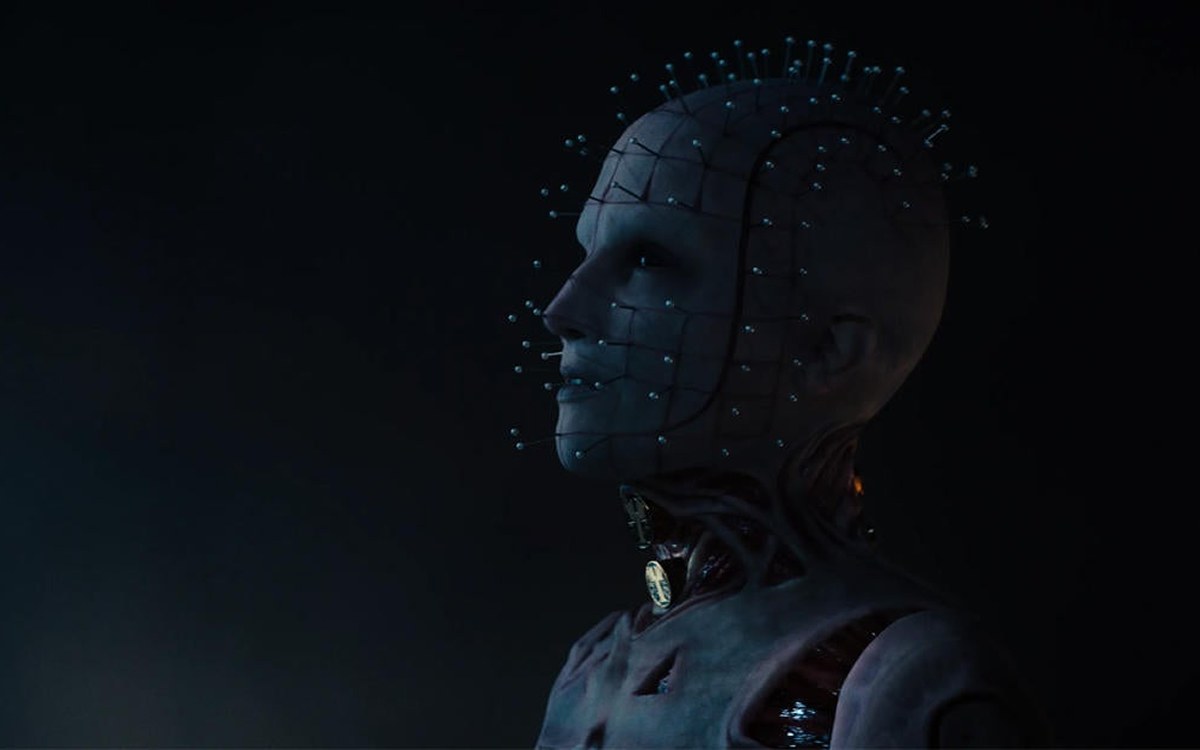
MY POLICEMAN (Oct. 21)
Last up (but definitely not least) is this hotly anticipated adaptation of Bethan Roberts novel about forbidden love and changing social conventions, which stars “It-Boy” of the day Harry Styles as Tom, a policeman in 1950s Britain at the center of a romantic triangle in which he splits his conflicted love between teacher Marion (Emma Corrin) and museum curator Patrick (David Dawson). The story spans four decades, fast-forwarding to the 1990s to give the now-older trio (Linus Roache, Gina McKee, and Rupert Everett) a last chance to repair the emotional damage of the past. Directed by Michael Grandage, this visually elegant, heart-stopping portrait of three people caught in the shifting tides of history might be the most “prestigious” title on our list. Whether or not it’s worthy of the hype that accompanies its pop-singer star, whose perceived sexual fluidity (he’s never labeled his sexuality, and continues to avoid doing so even two years into a relationship with actor-turned-filmmaker Olivia Wilde) continues to tantalize queer fans, is something we’ll have to wait until Oct. 21 – or Nov. 4, when producer Amazon makes it available for streaming on Prime – to find out.
Movies
Rise of Chalamet continues in ‘Marty Supreme’
But subtext of ‘American Exceptionalism’ sparks online debate
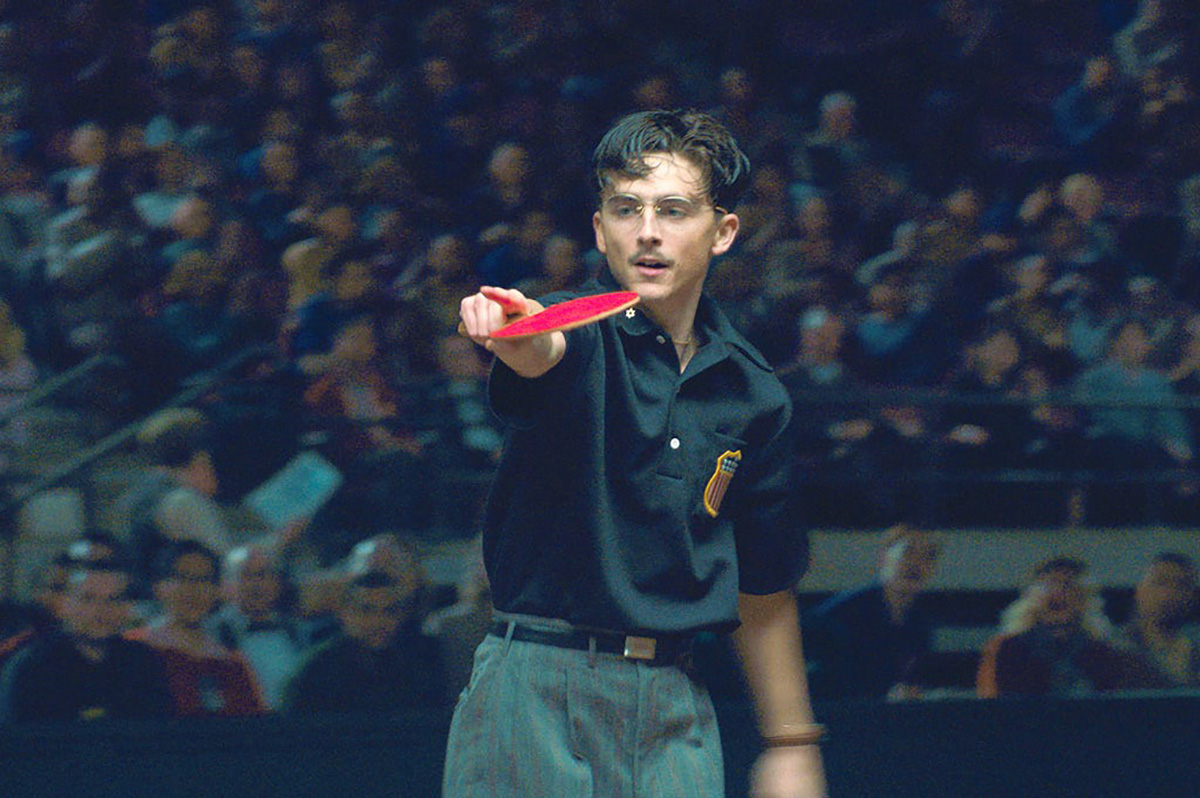
Casting is everything when it comes to making a movie. There’s a certain alchemy that happens when an actor and character are perfectly matched, blurring the lines of identity so that they seem to become one and the same. In some cases, the movie itself feels to us as if it could not exist without that person, that performance.
“Marty Supreme” is just such a movie. Whatever else can be said about Josh Safdie’s wild ride of a sports comedy – now in theaters and already racking up awards – it has accomplished exactly that rare magic, because the title character might very well be the role that Timothée Chalamet was born to play.
Loosely based on real-life table tennis pro Marty Reisman, who published his memoir “The Money Player” in 1974, this Marty (whose real surname is Mauser) is a first-generation American, a son of Jewish immigrant parents in post-WWII New York who works as a shoe salesman at his uncle’s store on the Lower East Side while building his reputation as a competitive table tennis player in his time off. Cocky, charismatic, and driven by dreams of championship, everything else in his life – including his childhood friend Rachel (Odessa A’zion), who is pregnant with his baby despite being married to someone else – takes a back seat as he attempts to make them come true, hustling every step of the way.
Inevitably, his determination to win leads him to cross a few ethical lines as he goes – such as stealing money for travel expenses, seducing a retired movie star (Gwyneth Paltrow), wooing her CEO husband (Kevin O’Leary) to sponsor him, and running afoul of the neighborhood mob boss (veteran filmmaker Abel Ferrara) – and a chain of consequences piles at his heels, threatening to undermine his success before it even has a chance to happen.
Filmed in 35mm and drenched in the visual style of the gritty-but-gorgeous “New Hollywood” cinema that Safdie – making his solo directorial debut without the collaboration of his brother Benny – so clearly seeks to evoke, “Marty Supreme” calls up unavoidable connections to the films of that era with its focus on an anti-hero protagonist trying to beat the system at its own game, as well as a kind of cynical amorality that somehow comes across more like a countercultural call-to-arms than a nihilistic social commentary. It’s a movie that feels much more challenging in the mid-2020s than it might have four or so decades ago, building its narrative around an ego-driven character who triggers all our contemporary progressive disdain; self-centered, reckless, and single-mindedly committed to attaining his own goals without regard for the collateral damage he inflicts on others in the process, he might easily – and perhaps justifiably – be branded as a classic example of the toxic male narcissist.
Yet to see him this way feels simplistic and reductive, a snap value judgment that ignores the context of time and place while invoking the kind of ethical purity that can easily blind us to the nuances of human behavior. After all, a flawed character is always much more authentic than a perfect one, and Marty Mauser is definitely flawed.
Yet in Chalamet’s hands, those flaws become the heart of a story that emphasizes a will to transcend the boundaries imposed by the circumstantial influences of class, ethnicity, and socially mandated hierarchy. His Marty is a person forging an escape path in a world that expects him to “know his place,” who is keenly aware of the anti-semitism and cultural conventions that keep him locked into a life of limited possibilities and who is willing to do whatever it takes to break free of them; and though he might draw our disapproval for the choices he makes, particularly with regard to his relationship with Rachel, he grows as he goes, navigating a character arc that is less interested in redemption for past sins than it is in finding the integrity to do better the next time – and frankly, that’s something that very few toxic male narcissists ever do.
In truth, it’s not surprising that Chalamet nails the part, considering that it’s the culmination of a project that began in 2018, when Safdie gave him Reisman’s book and suggested collaborating on a movie based on the story of his rise to success. The actor began training in table tennis, and continued to master it over the years, even bringing the necessary equipment to location shoots for movies like “Dune” so that he could perfect his skills – but physical skill aside, he always had what he needed to embody Marty. This is a character who knows what he’s got and is not ashamed to use it, who has the drive to succeed, the will to excel, and the confidence to be unapologetically himself while finding joy in the exercise of his talents, despite how he might be judged by those who see only ego. If any actor could be said to reflect those qualities, it’s Timothée Chalamet.
Other members of the cast also score deep impressions, especially A’zion, whose Rachel avoids tropes of victimhood to achieve her own unconventional character arc. Paltrow gives a remarkably vulnerable turn as the aging starlet who willingly allows Marty into her orbit despite the worldliness that tells her exactly what she’s getting into, while O’Leary embodies the kind of smug corporate venality that instantly positions him as the avatar for everything Marty is trying to escape. Queer fan-fave icons Fran Drescher and Sandra Bernhard also make small-but-memorable appearances, and real-life deaf table tennis player Koto Kawaguchi strikes a noble chord as the Japanese champion who becomes Marty’s de facto rival.
As for Safdie’s direction, it’s hard to find anything to criticize in his film’s visually stylish, sumptuously photographed (by Darius Khondji), and tightly paced delivery, which makes its two-and-a-half hour runtime fly by without a moment of drag.
It must be said that the screenplay – co-written by Safdie with Ronald Bronstein – leans heavily into an approach in which much of the plot hinges on implausible coincidences, ironic twists, and a general sense of orchestrated chaos that makes things occasionally feel a little too neat in the service of creating an outlandish “tall tale” narrative ; but let’s face it, life is like that sometimes, so it’s easy to overlook.
What might be more problematic, for some audiences, is Marty’s often insufferable – and occasionally downright ugly behavior. Yes, Chalamet infuses it all with humanizing authenticity, and the story is ultimately more about the character’s emotional evolution than it is about his winning at ping-pong, but it’s impossible not to read a subtext of American Exceptionalism into his winner-takes-all climb to victory – which is why “Marty Supreme,” for all its critical acclaim, is the subject of heated debate and outrage on social media right now.
As for us, we’re not condoning anything Marty does or says as he hustles his way to the winner’s circle. All we’re saying is that Timothée Chalamet has become an even better actor since he captured our attention (and a lot of gay hearts) in “Call Me By Your Name.”
And that’s saying a lot, because he was pretty great, even then.
Movies
A Shakespearean tragedy comes to life in exquisite ‘Hamnet’
Chloe Zhao’s devastating movie a touchstone for the ages
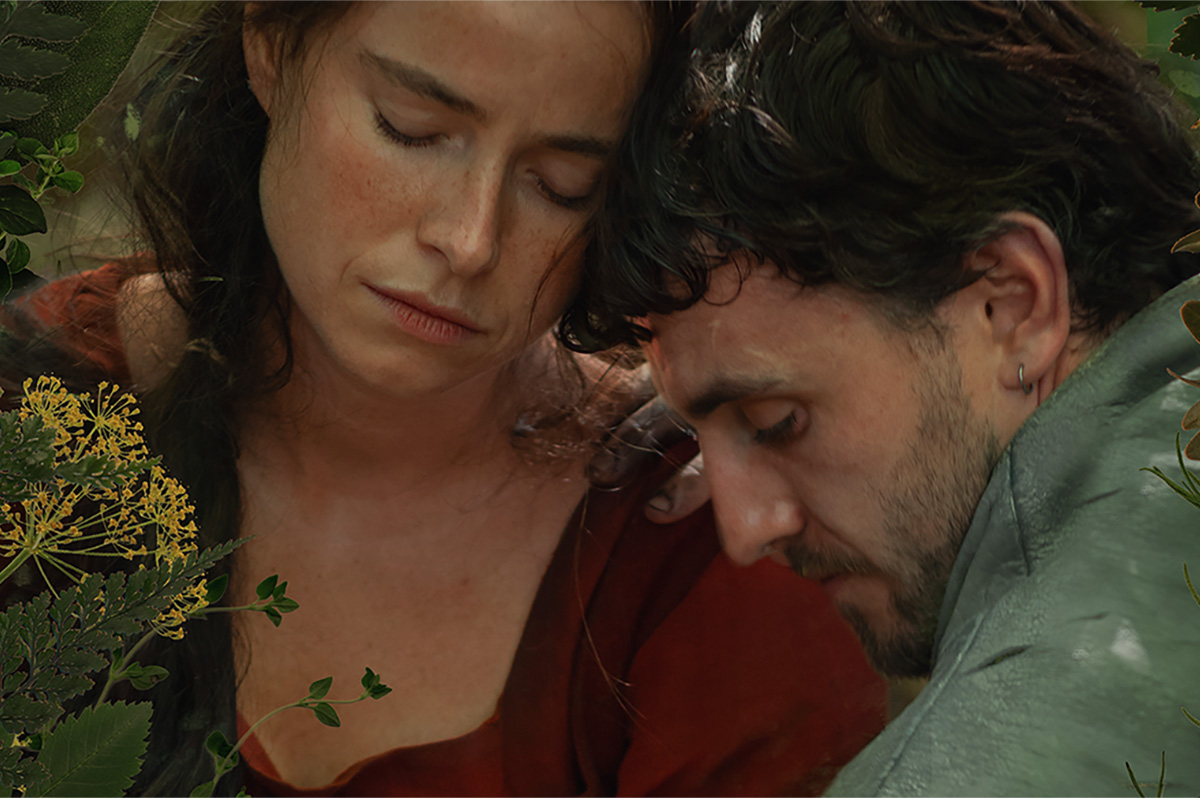
For every person who adores Shakespeare, there are probably a dozen more who wonder why.
We get it; his plays and poems, composed in a past when the predominant worldview was built around beliefs and ideologies that now feel as antiquated as the blend of poetry and prose in which he wrote them, can easily feel tied to social mores that are in direct opposition to our own, often reflecting the classist, sexist, and racist patriarchal dogma that continues to plague our world today. Why, then, should we still be so enthralled with him?
The answer to that question might be more eloquently expressed by Chloe Zhao’s “Hamnet” – now in wide release and already a winner in this year’s barely begun awards season – than through any explanation we could offer.
Adapted from the novel by Maggie O’Farrell (who co-wrote the screenplay with Zhao), it focuses its narrative on the relationship between Will Shakespeare (Paul Mescal) and his wife Agnes Hathaway (Jessie Buckley), who meet when the future playwright – working to pay off a debt for his abusive father – is still just a tutor helping the children of well-to-do families learn Latin. Enamored from afar at first sight, he woos his way into her life, and, convincing both of their families to approve the match (after she becomes pregnant with their first child), becomes her husband. More children follow – including Hamnet (Jacobi Jupe), a “surprise” twin boy to their second daughter – but, recognizing Will’s passion for writing and his frustration at being unable to follow it, Agnes encourages him to travel to London in order to immerse himself in his ambitions.
As the years go by, Agnes – aided by her mother-in-law (Emily Watson) and guided by the nature-centric pagan wisdom of her own deceased mother – raises the children while her husband, miles away, builds a successful career as the city’s most popular playwright. But when an outbreak of bubonic plague results in the death of 11-year-old Hamnet in Will’s absence, an emotional wedge is driven between them – especially when Agnes receives word that her husband’s latest play, titled “Hamlet,” an interchangeable equivalent to the name of their dead son, is about to debut on the London stage.
There is nothing, save the bare details of circumstance around the Shakespeare family, that can be called factual about the narrative told in “Hamnet.” Records of Shakespeare’s private life are sparse and short on context, largely limited to civic notations of fact – birth, marriage, and death announcements, legal documents, and other general records – that leave plenty of space in which to speculate about the personal nuance such mundane details might imply. What is known is that the Shakespeares lost their son, probably to plague, and that “Hamlet” – a play dominated by expressions of grief and existential musings about life and death – was written over the course of the next five years. Shakespearean scholars have filled in the blanks, and it’s hard to argue with their assumptions about the influence young Hamnet’s tragic death likely had over the creation of his father’s masterwork. What human being would not be haunted by such an event, and how could any artist could avoid channeling its impact into their work, not just for a time but for forever after?
In their screenplay, O’Farrell and Zhao imagine an Agnes Shakespeare (most records refer to her as “Anne” but her father’s will uses the name “Agnes”) who stands apart from the conventions of her town, born of a “wild woman” in the woods and raised in ancient traditions of mysticism and nature magic before being adopted into her well-off family, who presents a worthy match and an intellectual equal for the brilliantly passionate creator responsible for some of Western Civilization’s most enduring tales. They imagine a courtship that would have defied the customs of the time and a relationship that feels almost modern, grounded in a love and mutual respect that’s a far cry from most popular notions of what a 16th-century marriage might look like. More than that, they imagine that the devastating loss of a child – even in a time when the mortality rate for children was high – might create a rift between two parents who can only process their grief alone. And despite the fact that almost none of what O’Farrell and Zhao present to us can be seen, at best, as anything other than informed speculation, it all feels devastatingly true.
That’s the quality that “Hamnet” shares with the ever-popular Will Shakespeare; though it takes us into a past that feels as alien to us as if it took place upon a different planet, it evokes a connection to the simple experience of being human, which cuts through the differences in context. Just as the kings, heroes, and fools of Shakespeare’s plays express and embody the same emotional experiences that shape our own mundane modern lives, the film’s portrayal of these two real-life people torn apart by personal tragedy speaks directly to our own shared sense of loss – and it does so with an eloquence that, like Shakespeare’s, emerges from the story to make it feel as palpable as if their grief was our own.
Yes, the writing and direction – each bringing a powerfully feminine “voice” to the story – are key to the emotional impact of “Hamnet,” but it’s the performances of its stars that carry it to us. Mescal, once more proving himself a master at embodying the kind of vulnerable masculine tenderness that’s capable of melting our hearts, gives us an accessible Shakespeare, driven perhaps by a spark of genius yet deeply grounded in the tangible humanity that underscores the “everyman” sensibility that informs the man’s plays. But it’s Buckley’s movie, by a wide margin, and her bold, fierce, and deeply affecting performance gives voice to a powerful grief, a cry against the injustice and cruelty of what we fumblingly call “fate” that resonates deep within us and carries our own grief, over losses we’ve had and losses we know are yet to come, along with her on the journey to catharsis.
That’s the word – “catharsis” – that defines why Shakespeare (and by extension, “Hamnet”) still holds such power over the imagination of our human race all these centuries later. The circumstantial details of his stories, wrapped up in ancient ideologies that still haunt our cultural imagination, fall away in the face of the raw expression of humanity to which his characters give voice. When Hamlet asks “to be or not to be?,” he is not an old-world Danish Prince contemplating revenge against a traitor who murdered his father; he is Shakespeare himself, pondering the essential mystery of life and death, and he is us, too.
Likewise, the Agnes Shakespeare of “Hamnet” (masterfully enacted by Buckley) embodies all our own sorrows – past and future, real and imagined – and connects them to the well of human emotion from which we all must drink; it’s more powerful than we expect, and more cleansing than we imagine, and it makes Zhao’s exquisitely devastating movie into a touchstone for the ages.
We can’t presume to speak for Shakespeare, but we are pretty sure he would be pleased.
Movies
‘Hedda’ brings queer visibility to Golden Globes
Tessa Thompson up for Best Actress for new take on Ibsen classic

The 83rd annual Golden Globes awards are set for Sunday (CBS, 8 p.m. EST). One of the many bright spots this awards season is “Hedda,” a unique LGBTQ version of the classic Henrik Ibsen story, “Hedda Gabler,” starring powerhouses Nina Hoss, Tessa Thompson and Imogen Poots. A modern reinterpretation of a timeless story, the film and its cast have already received several nominations this awards season, including a Globes nod for Best Actress for Thompson.
Writer/director Nia DaCosta was fascinated by Ibsen’s play and the enigmatic character of the deeply complex Hedda, who in the original, is stuck in a marriage she doesn’t want, and still is drawn to her former lover, Eilert.
But in DaCosta’s adaptation, there’s a fundamental difference: Eilert is being played by Hoss, and is now named Eileen.
“That name change adds this element of queerness to the story as well,” said DaCosta at a recent Golden Globes press event. “And although some people read the original play as Hedda being queer, which I find interesting, which I didn’t necessarily…it was a side effect in my movie that everyone was queer once I changed Eilert to a woman.”
She added: “But it still, for me, stayed true to the original because I was staying true to all the themes and the feelings and the sort of muckiness that I love so much about the original work.”
Thompson, who is bisexual, enjoyed playing this new version of Hedda, noting that the queer love storyline gave the film “a whole lot of knockoff effects.”
“But I think more than that, I think fundamentally something that it does is give Hedda a real foil. Another woman who’s in the world who’s making very different choices. And I think this is a film that wants to explore that piece more than Ibsen’s.”
DaCosta making it a queer story “made that kind of jump off the page and get under my skin in a way that felt really immediate,” Thompson acknowledged.
“It wants to explore sort of pathways to personhood and gaining sort of agency over one’s life. In the original piece, you have Hedda saying, ‘for once, I want to be in control of a man’s destiny,’” said Thompson.
“And I think in our piece, you see a woman struggling with trying to be in control of her own. And I thought that sort of mind, what is in the original material, but made it just, for me, make sense as a modern woman now.”
It is because of Hedda’s jealousy and envy of Eileen and her new girlfriend (Poots) that we see the character make impulsive moves.
“I think to a modern sensibility, the idea of a woman being quite jealous of another woman and acting out on that is really something that there’s not a lot of patience or grace for that in the world that we live in now,” said Thompson.
“Which I appreciate. But I do think there is something really generative. What I discovered with playing Hedda is, if it’s not left unchecked, there’s something very generative about feelings like envy and jealousy, because they point us in the direction of self. They help us understand the kind of lives that we want to live.”
Hoss actually played Hedda on stage in Berlin for several years previously.
“When I read the script, I was so surprised and mesmerized by what this decision did that there’s an Eileen instead of an Ejlert Lovborg,” said Hoss. “I was so drawn to this woman immediately.”
The deep love that is still there between Hedda and Eileen was immediately evident, as soon as the characters meet onscreen.
“If she is able to have this emotion with Eileen’s eyes, I think she isn’t yet because she doesn’t want to be vulnerable,” said Hoss. “So she doesn’t allow herself to feel that because then she could get hurt. And that’s something Eileen never got through to. So that’s the deep sadness within Eileen that she couldn’t make her feel the love, but at least these two when they meet, you feel like, ‘Oh my God, it’s not yet done with those two.’’’
Onscreen and offscreen, Thompson and Hoss loved working with each other.
“She did such great, strong choices…I looked at her transforming, which was somewhat mesmerizing, and she was really dangerous,” Hoss enthused. “It’s like when she was Hedda, I was a little bit like, but on the other hand, of course, fascinated. And that’s the thing that these humans have that are slightly dangerous. They’re also very fascinating.”
Hoss said that’s what drew Eileen to Hedda.
“I think both women want to change each other, but actually how they are is what attracts them to each other. And they’re very complimentary in that sense. So they would make up a great couple, I would believe. But the way they are right now, they’re just not good for each other. So in a way, that’s what we were talking about. I think we thought, ‘well, the background story must have been something like a chaotic, wonderful, just exploring for the first time, being in love, being out of society, doing something slightly dangerous, hidden, and then not so hidden because they would enter the Bohemian world where it was kind of okay to be queer and to celebrate yourself and to explore it.’”
But up to a certain point, because Eileen started working and was really after, ‘This is what I want to do. I want to publish, I want to become someone in the academic world,’” noted Hoss.
Poots has had her hands full playing Eileen’s love interest as she also starred in the complicated drama, “The Chronology of Water” (based on the memoir by Lydia Yuknavitch and directed by queer actress Kristen Stewart).
“Because the character in ‘Hedda’ is the only person in that triptych of women who’s acting on her impulses, despite the fact she’s incredibly, seemingly fragile, she’s the only one who has the ability to move through cowardice,” Poots acknowledged. “And that’s an interesting thing.”

